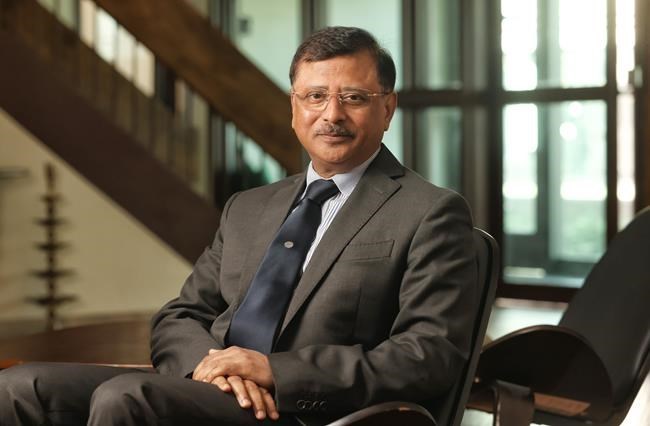OTTAWA — India's envoy to Canada says he is satisfied the federal government is adequately protecting his country's diplomats, after New Delhi raised concerns for their safety earlier this year.
Indian High Commissioner Sanjay Kumar Verma also says he's optimistic both countries can circumvent heated diaspora politics to form closer ties.
"Freedom has both sides of the coin, and it's a delicate balance, which has to be maintained by society," Verma told The Canadian Press in a wide-ranging interview Aug. 31.
Canada and India have disagreed for years about Ottawa's response to a long-standing Indian separatist movement that has supporters across this country but things escalated earlier this year when police were asked to investigate alleged death threats against Indian diplomats in Canada.
Those threats arose following the murder of a gurdwara leader in Surrey, B.C., which some in the Sikh community say was a politically motivated attack.
Police said they have no evidence of any links to foreign interference and had no reason to believe the Sikh community in Canada is at risk. But following the death of Hardeep Singh Nijjar, the U.S.-based group Sikhs for Justice called on supporters in Canada to "besiege" India's diplomatic missions, offering cash rewards for the home addresses of its diplomats. Some posters called on people to "Kill India," while others refer to Verma and his consuls general as killers.
India then formally called on Canada to better uphold its duty to protect foreign diplomats. Verma said the issue surrounded not only threats, but large protests that blocked access to the building.
"There have been posters where I am called an assassin. There is a reward on my head today by the Khalistani terrorists, and when I look at that, I say, 'If that is freedom of expression, I do not know which world I'm living in,'" Verma said last week.
"If a reward is put on my head, doesn't it restrict my movement? So where is my freedom to move freely in this country?" he said.
He said however "we feel very satisfied" Canada responded appropriately to the request for better protection.
"Our concerns have been taken on board. It has been well understood," Verma said.
The Khalistani separatist movement advocates for part of the Indian state of Punjab to become an independent country, but the Indian government perceives this as an extremist movement that endangers national security. India has long accused Canada of harbouring extremists, while Ottawa has continually maintained that freedom of speech means groups can voice political opinions if they don't use violence.
Nijjar's death came after additional strain on diplomatic relations between the two countries this spring.
In March, Canadian members of Parliament from various parties expressed concerns about free speech in India, after authorities there restricted the internet and limited gatherings, while they searched for a Sikh leader following the violent storming of a police station. That crackdown also sparked a rowdy March 23 protest outside India's High Commission in Ottawa.
In June, Trudeau’s national security adviser Jody Thomas said India was among the top sources of foreign interference in Canada, a public designation Ottawa has largely limited to authoritarian states.
Then videos emerged of a parade in Brampton, Ont., that included a float that portrayed the 1984 assassination of prime minister Indira Gandhi by her two Sikh bodyguards. Organizers said the float was part of a parade honouring those who died while pursuing Khalistan independence. Gandhi's assassination followed her authorization of a military standoff that killed Sikh militants and sparked deadly riots, which killed thousands.
But officials in both countries said the parade float glorified violence. India's foreign minister Subrahmanyam Jaishankar argued the incident showed Ottawa's lax approach to extremism, adding that it hurts the bilateral relationship.
The Business Council of Canada fears the Khalistan issue is putting a chill on years-long attempts for both countries to sign a trade deal. It also comes as Prime Minister Justin Trudeau is set to visit New Delhi this week for the G20 leaders' summit.
Canada has paused ongoing negotiations for a trade agreement, but federal Trade Minister Mary Ng said the pause is only "a reflection to take stock of where are."
"Trade agreements are complex and there are many things that go into that," she said in Jakarta where she is travelling with Prime Minister Justin Trudeau.
Verma said India wants Nijjar's murder "investigated to the fullest."
"Those who have committed this grievous injury should be punished according to Canadian law," Verma said.
"As a private individual, I felt hurt that a person was killed. And when I look at the reasons there could be many, and these reasons may not necessarily be only Khalistan-driven."
Verma said India does not expect Canada to forbid anyone from expressing support for Khalistan, saying freedom of speech is a "quintessential pillar" for both countries.
He stressed that it wouldn't be appropriate for a foreign diplomat to tell Canada what to do, but he suggested Ottawa could do more.
"Our expectation is that all countries in the world understand our sensitivity, that if those people are supported from foreign lands, who want India to be fragmented, not to remain an integrated India, will have our concerns. These sensitivities are well known globally, including in Canada," he said.
Nadir Patel, Canada's former high commissioner to India, said in an interview that Khalistan is "a significant irritant" that has been long-standing in the relationship, but said both countries can probably find "a pragmatic reality" to surmount the issue.
"It's important that both sides, not one or the other … listen to each other's perspectives and concerns a trying to understand,” said Patel, a senior strategic adviser with Norton Rose Fulbright Canada.
He suggested cabinet ministers from both countries navigate the issue by ensuring freedom of expression, while undertaking "greater co-operation within existing frameworks between our security agencies."
This report by The Canadian Press was first published Sept. 5, 2023.
Dylan Robertson, The Canadian Press




